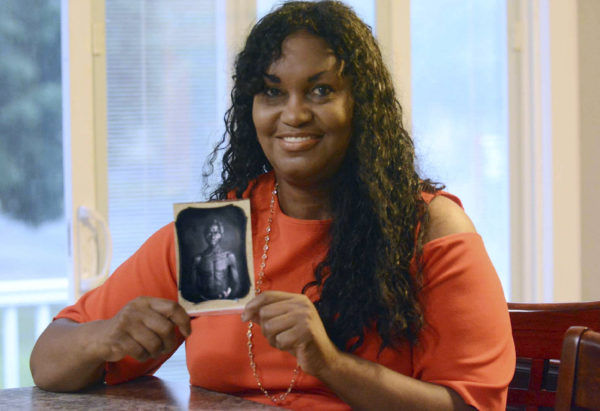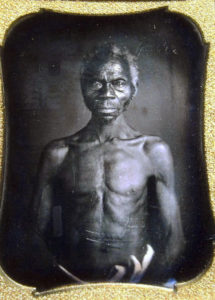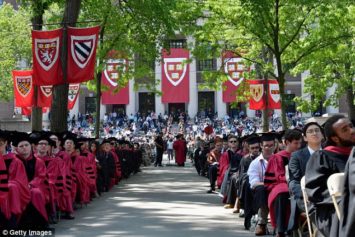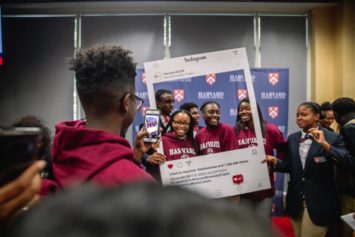A woman who says she is the descendant of two slaves in daguerreotypes owned by Harvard University has filed a lawsuit saying the institution is wrongfully profiting from the 19th-century photographs.
Tamara Lanier is a resident of Norwich, Connecticut who filed her suit against the Ivy League in Middlesex County Superior Court on Wednesday, March 20. The documents reveal she is suing for wrongful seizure, possession and monetization of the images of who she says is her great-great-great grandfather — a South Carolina slave named Renty — and his daughter, Delia. The filing also alleges Harvard ignored her requests to “stop licensing the pictures for the university’s profit” as well as misrepresents Renty.

In this July 17, 2018, photo, Tamara Lanier holds an 1850 photograph of Renty, a South Carolina slave who Lanier said is her family’s patriarch, at her home in Norwich, Conn. The portrait was commissioned by Harvard biologist Louis Agassiz, whose ideas were used to support the enslavement of Africans in the United States. Lanier filed a lawsuit on Wednesday, March 20, 2019, in Massachusetts state court, demanding that Harvard turn over the photo and pay damages. (John Shishmanian/The Norwich Bulletin via AP)
The images were commissioned to be taken by former Harvard professor Louis Agassiz to support the now-debunked theory of polygenism, an idea used to support white supremacy. One of Lanier’s attorneys, Michael Koskoff, argues the 1850s portraits, in which Remy and Delia were forced to pose in the nude, “were taken under duress and Harvard has no right to keep them, let alone profit from them.”
“They are the rightful property of the descendants of Papa Renty,” he added.
In addition to Koskoff, Lanier is also represented by the law firms of Florida-based Benjamin Crump. The civil rights attorney rose to national prominence when he represented the families of Trayvon Martin and Michael Brown, both of whom were unarmed when gunned down, Martin by a private citizen and Brown by a cop, in 2012 and 2014 respectively.
Lanier, who is seeking unspecified damages, demands Harvard give the photos in question to her. She told USA Today that she has provided information to the university since 2011 that shows she has direct lineage to Renty. However, the institution continuously refused her pleas to examine the research.

This July 17, 2018 copy photo shows a 1850 Daguerreotype of Renty, a South Carolina slave who Tamara Lanier, of Norwich, Conn., said is her family’s patriarch. The portrait was commissioned by Harvard biologist Louis Agassiz, whose ideas were used to support the enslavement of Africans in the United States. Lanier filed a lawsuit on Wednesday, March 20, 2019, in Massachusetts state court, demanding that Harvard turn over the photo and pay damages. (Courtesy of Harvard University/The Norwich Bulletin via AP)
“This will force them to look at my information,” Lanier, a former chief probation officer, said to the newspaper. “It will also force them to publicly have the discussion about who Renty was and restoring him his dignity.”
When reached for comment by USA Today on Wednesday, Harvard spokesman Jonathan Swain said the university “has not yet been served, and with that is in no position to comment on this lawsuit filing.”
Another allegation Lanier charges in the filing is that the school is using the image of the man she refers to as “Papa Renty” to “enrich itself.” The photograph, which sees the gray-haired enslaved man pictured waist up and staring directly into the camera with his mouth closed, was lost for more than a 100 years until it and 11 other images were found in the attic of Harvard University’s Peabody Museum of Archaeology and Ethnology in 1976.
Now, Renty’s image covers the 2017 book, “From Site to Sight: Anthropology, Photography and the Power of Imagery.” The title, which is published by the Peabody Museum, is sold by Harvard University Press for $40. Additionally, Renty’s likeness also covered a program a 2017 conference that Harvard’s Radcliffe Institute for Advance Study that focused on the university’s association with slavery.
“Papa Renty was a proud and kind man who, like so many enslaved men, women, and children endured years of unimaginable horrors,” Lanier said in the suit. “Harvard’s refusal to honor our family’s history by acknowledging our lineage and its own shameful past is an insult to Papa Renty’s life and memory.”


